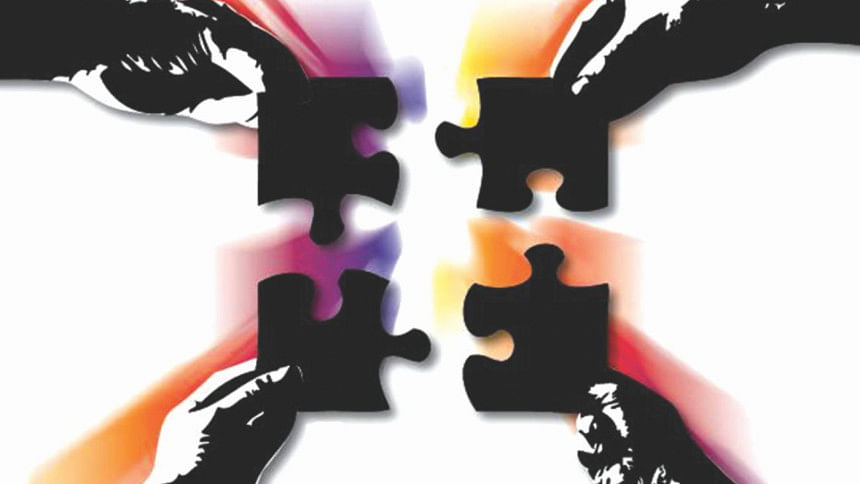Why we need a disability inclusion revolution

Anita's father holds up his eleven-year-old daughter with both hands under her arms -- supporting her to stand as his wife makes the payments for groceries that they bought. An elderly man standing behind them at the counter looks over at Anita and her father. The man peers over and asks:
"Apnar meyer kihoyeche?" (What's wrong with your daughter?)
Anita's father replies uncomfortably, "Kichuna o majhemajhe porey jai toh." (Nothing's wrong, she just falls sometimes.)
The man keeps staring and as Anita's father moves away from the counter, he calls out "Thik koren, thik koren, noiley biye diben kemne?" (Get the problem fixed, or else how will you get her married off?)
Anita has epilepsy. Epilepsy is a neurological disorder associated with abnormal electrical activity in the brain and can trigger loss of consciousness, or convulsions. Even if we were to ignore the sexism and the gross insensitivity of that remark, what is evident is that the psyche of our society holds that people with disabilities are inherently flawed and hence guilty of falling short in the capacity to participate in society. Participate in what is deemed the "normal" way of life; in this case having a functional moving body, getting married, etc. Anything outside these standards, which, if you really think about it, are too simplistic anyway, need to be "fixed" or else these people and their families are condemned to live with the guilt and shame forever.
Our prejudices towards people with health conditions such as mental illnesses, learning and developmental disabilities are often mired in our social practices through divisive concepts embedded in norms around family, class, religion and ideology.
Essentially though, exclusion is a denial of merit, of capacity. As Chinua Achebe, the famous Nigerian writer puts it in his novel There was a Country, "The denial of merit is a form of social injustice that can hurt not only the individuals directly concerned but ultimately the entire society. The motive for the original denial may be tribal discrimination, but it may also come from sexism, from political, religious, or some other partisan consideration, or from corruption and bribery. It is unnecessary to examine these various motives separately; it is sufficient to state that whenever merit is set aside by prejudice of whatever origin, individual citizens as well as a nation itself are victimised."
Apart from being the moral imperative, being inclusive of disabled people is actually beneficial for the world. Designing infrastructure for disability makes life a lot easier for everyone. Also in a country like Bangladesh that is now considered a lower middle income economy, the cost of disability exclusion, which is about USD one billion per year or 1.74 percent of our GDP, is a high price. In a study conducted by the Bangladesh Institute of Development Studies on the Economics of Disability and Children at Risk in Bangladesh, disability is both a cause and consequence of poverty. The paper identifies that in Bangladesh the economic cost of disability is comprised of children with disabilities losing out on school; lack of employment of people with disability; adults missing out on many employment opportunities so that they can take care of people with disabilities in their families; and children helping family members with disability missing out on educational opportunities. Thus, the cost to the economy of not being inclusive is very high.
There are many ways in which being more inclusive of people with disabilities benefits everyone. With access to education and employment, the world's most vulnerable population can not only become self-sufficient but also prevent economic loss for our country.
With the ongoing conflicts of extremism and the onset of the fourth industrial revolution, heightened urbanisation, increasing human insecurity, poverty, natural disasters, migration, hunger, which are all drastic changes we need to cope with, it is now more than ever crucial that the world needs to be inclusive.
For too long, however, the approach to disability inclusion has been a charity based approach, largely because of lack of awareness and knowledge about disability. In most cases, the only time people encounter people with disabilities is on the streets as beggars. There are over 500 disabled people's organisations in Bangladesh which focus on giving therapy, assistive devices, vocational skills, which is important but also accentuates the fact that "they" need to adjust to an able bodied society. Whereas, there is nothing being done to change society into being more inclusive of them.
While there are many laws and regulations passed recently on building ramps, reserving seats and quotas for people with disabilities, the rights based approach has yet to be enacted. We have buses with reserved seats but no provision such as a ramp or tactile walk way for a person with disability (PwD) to actually get on the bus. Taking to the streets with PwDs in the forefront has been limited to one-off events that bring no constructive changes to the lives of disabled people.
We need to teach the social definition of disability in our schools and workplaces which says disability is not an attribute of a society but the social barriers that prevent people with certain conditions from participating in society. People with disabilities create diversity in society; they create an environment where having the necessary accommodations and being able to perform ones duties to the best of one's ability, matters. When our social institutes, our schools, workplaces and social gatherings are inclusive of disabled people, we will be naturally promoting diversity.
As Martin Luther King Jr. wrote, "A social movement that only moves people is merely a revolt. A movement that changes both people and institutions is a revolution."
That is the kind of revolution we need.
The writer is founder and Project Director, Identity Inclusion.

 For all latest news, follow The Daily Star's Google News channel.
For all latest news, follow The Daily Star's Google News channel. 



Comments